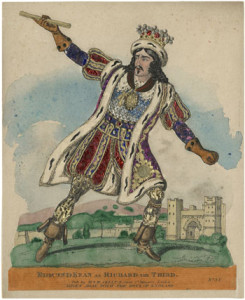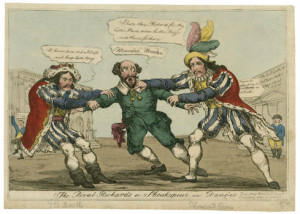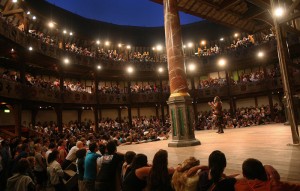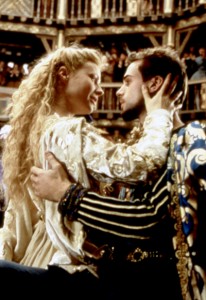A day late–or possibly even more, because no one really knows the date, but happily April 23 is also St. George’s Day, by a fortuitous coincidence. So I thought I’d make a stab at the huge topic of Shakespeare during the Regency, a time of both revival and suppression.
Essentially people have been tinkering with Shakespeare before his ink was barely dry, and the late eighteenth and early nineteenth centuries were no exception. There was a great Shakespeare revival in the period, thanks in part to larger theaters, not to mention larger than life performers:
The Kembles were statuesque: the two factors, which, according to James Boaden in 1826, caused Sarah Siddons to change her style were the larger theaters and ‘her delight in statuary, which directed her attention to the antique and made a remarkable impression upon her as to simplicity of attire and severity of attitude … Hazlitt thought Kemble was ‘the very still life and statuary of the stage … an icicle upon the bust of tragedy.’ Such frigidity was especially absurd off stage: a contemporary remembered Kemble at breakfast looking as if he had eaten ‘a poached curtain rod’. Read more
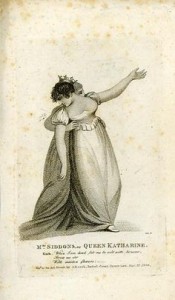 Mrs. Siddons made the role of Queen Katherine in Henry VIII one of her signature roles. Henry VIII also plays a pivotal role in Austen’s Mansfield Park–Austen came from a family that loved the theater, performed amateur productions, and almost certainly read Shakespeare aloud to each other. The seductive Henry Crawford reads aloud from the play and Edmund becomes jealous:
Mrs. Siddons made the role of Queen Katherine in Henry VIII one of her signature roles. Henry VIII also plays a pivotal role in Austen’s Mansfield Park–Austen came from a family that loved the theater, performed amateur productions, and almost certainly read Shakespeare aloud to each other. The seductive Henry Crawford reads aloud from the play and Edmund becomes jealous:
Edmund watched the progress of her attention, and was amused and gratified by seeing how she gradually slackened in the needlework, which at the beginning seemed to occupy her totally: how it fell from her hand while she sat motionless over it, and at last, how the eyes which had appeared so studiously to avoid him throughout the day were turned and fixed on Crawford—fixed on him for minutes, fixed on him, in short, till the attraction drew Crawford’s upon her, and the book was closed, and the charm was broken.
Crawford elsewhere in the book states that Shakespeare “… is a is a part of an Englishman’s constitution. His thoughts and beauties are so spread abroad that one touches them every where, one is intimate with him by instinct.” Edmund agrees, saying that “No doubt, one is familiar with Shakespeare …from one’s earliest years. His celebrated passages are quoted by every body; they are in half the books we open, and we all talk Shakespeare,…”
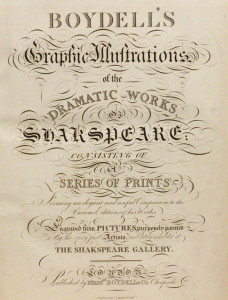 Shakespeare was big business. In 1786, engraver and publisher John Boydell began an ambitious project to foster a school of English history painters and publish an illustrated edition of Shakespeare and a folio of engravings based on commissioned paintings. The Boydell Shakespeare Gallery in London enjoyed enormous popularity during the 1790s.
Shakespeare was big business. In 1786, engraver and publisher John Boydell began an ambitious project to foster a school of English history painters and publish an illustrated edition of Shakespeare and a folio of engravings based on commissioned paintings. The Boydell Shakespeare Gallery in London enjoyed enormous popularity during the 1790s.
Here’s an engraving from the collection by Robert Smirke:
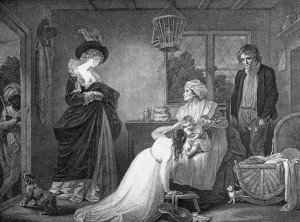 I have to admit I had trouble guessing what play this could possibly be. It’s an illustration of infancy (the infant, mewling and puking in the nurse’s arms) from As You Like It, beautifully translated to the late eighteenth century. A very well-dressed lady is visiting the foster family of her latest child, but I’m not sure whether it’s her child or that of the woman kneeling in the foreground. I love the details of this–the cottage loaf on the table, the poor but honest foster family, and the dog barking at the black servant outside.
I have to admit I had trouble guessing what play this could possibly be. It’s an illustration of infancy (the infant, mewling and puking in the nurse’s arms) from As You Like It, beautifully translated to the late eighteenth century. A very well-dressed lady is visiting the foster family of her latest child, but I’m not sure whether it’s her child or that of the woman kneeling in the foreground. I love the details of this–the cottage loaf on the table, the poor but honest foster family, and the dog barking at the black servant outside.
I think the two examples from Mansfield Park sum up the contemporary attitude toward Shakespeare–our playwright, but also an artist who can be disturbing or unwholesome. And that brings us to the sorry case of King Lear. In 1681, Nahum Tate rewrote–or “Reviv’d with Alterations,” as he put it–the play as The History of King Lear for the sophisticated patrons of London’s theaters. Notably, he gave it a happy ending, provided Cordelia with a love interest, dropped the role of the Fool, and so on. You can read his description of the changes and the whole text here. Incredibly, this was the version in use until 1823 when Edmund Kean restored the tragic ending, although Tate’s version remained in use throughout the nineteenth century. But performance of the play was banned entirely from 1810 until after the death of George III, because the story of a failing king succumbing to madness and being the head of a very dysfunctional family was a little too close for comfort. You can read more at The Regency Redingcote and What’s It All About Shakespeare.
And then, bless his heart, there was Dr. Bowdler who found that reading Shakespeare aloud to his family could be a little icky, apparently something that didn’t bother the Austens. He censored as he went (I used to do much the same when reading the Care Bears to my toddler daughter) and then had the bright idea of publishing his cleaned up version in 1818: THE FAMILY SHAKSPEARE, in which nothing is added to the Original Text; but those Expressions are omitted which cannot with propriety be read aloud.
What’s your favorite Shakespeare play or movie version? Or have you seen a particularly good production recently?





